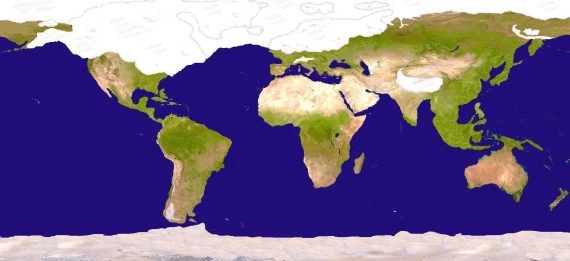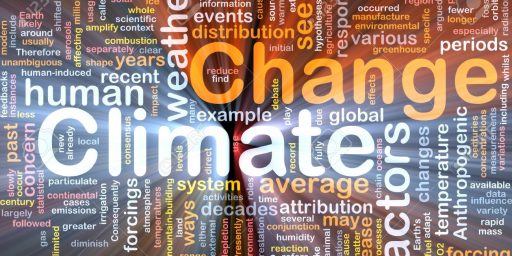Global Warming Holding Off The Next Ice Age?
Are carbon emissions saving us all from a cold, cold fate?
The BBC is reporting that a group of scientists is theorizing that the increased carbon emissions responsible at least in some part for the rise in global temperatures may be delaying the onset of the next Ice Age:
The last Ice Age ended about 11,500 years ago, and when the next one should begin has not been entirely clear.
Researchers used data on the Earth’s orbit and other things to find the historical warm interglacial period that looks most like the current one.
In the journal Nature Geoscience, they write that the next Ice Age would begin within 1,500 years – but emissions have been so high that it will not
“At current levels of CO2, even if emissions stopped now we’d probably have a long interglacial duration determined by whatever long-term processes could kick in and bring [atmospheric] CO2 down,” said Luke Skinner from Cambridge University.
Dr Skinner’s group – which also included scientists from University College London, the University of Florida and Norway’s Bergen University – calculates that the atmospheric concentration of CO2 would have to fall below about 240 parts per million (ppm) before the glaciation could begin.
The current level is around 390ppm.
Other research groups have shown that even if emissions were shut off instantly, concentrations would remain elevated for at least 1,000 years, with enough heat stored in the oceans potentially to cause significant melting of polar ice and sea level rise.
Of course, a good part of this is guesswork because the precise conditions that cause the Ice Ages that have waxed and waned over the Earth over billions of years aren’t precisely known. Part of it seems to involve subtle differences in the Earth’s orbit. There have been suggestions recently that there was a relationship between the cycle and the pattern of sunspot activity. And, now, of course, we have the possibility that human activity itself will have an influence on the crisis, perhaps extending an interglacial period that would have ended relatively soon geologically speaking. As I’ve noted before, it isn’t really surprising to learn that human activity has an impact on the climate of the planet
Of course, this study is already being cited by opponents in the entire “climate change” debate which has become far too political for something that ought to be a matter of science:
Groups opposed to limiting greenhouse gas emissions are already citing the study as a reason for embracing humankind’s CO2 emissions.
The UK lobby group the Global Warming Policy Foundation, for example, has flagged up a 1999 essay by astronomers Sir Fred Hoyle and Chandra Wickramasinghe, who argued that: “The renewal of ice-age conditions would render a large fraction of the world’s major food-growing areas inoperable, and so would inevitably lead to the extinction of most of the present human population.
“We must look to a sustained greenhouse effect to maintain the present advantageous world climate. This implies the ability to inject effective greenhouse gases into the atmosphere, the opposite of what environmentalists are erroneously advocating.”
Luke Skinner said his group had anticipated this kind of reception.
“It’s an interesting philosophical discussion – ‘would we better off in a warm [interglacial-type] world rather than a glaciation?’ and probably we would,” he said.
“But it’s missing the point, because where we’re going is not maintaining our currently warm climate but heating it much further, and adding CO2 to a warm climate is very different from adding it to a cold climate.
Indeed. In fact if we were living in a world where the evidence indicated that a severe Ice Age was imminent, it might arguably be a good idea to increase carbon emissions, or in some other way create conditions that would lead to a Greenhouse Effect in the atmosphere. That’s not really where we are right now, though, and it’s worth noting that we don’t really know how accurate these conclusions are.
I’m sure the Rush Limbaugh’s of the world will point news like this as proof that global warming is a good thing now, which will be a diversion from their typical line that there is no such thing as climate change to which human activity contributes. It’s a simplistic argument, but it’s one that sells easily to the masses. Such, I suppose, is the price of living in a country where scientific literacy is so appallingly ignored.
H/T: Jazz Shaw






Waaaiiiitttt a minute….. Weren’t these guys saying just yesterday that CO-2 had no effect on the climate?
BWAHAHAHAHAHHAAAHAAAHEEEHEEEEHEEEHEEEH……. Gaaaaassspppp. SOMEBODY CALL ME AN AMBULANCE! IT”S THE IRONY BUG!
No. It would not. Not now. Not ever. Climate is way too complex a thing for us to ever attempt to try to manipulate. Like we are now. The Law of Unintended Consequences and what not.
Repeat after me Doug: We are not Gods. We are mere humans who could f*ck up a wet dream. We are not Gods. We are not Gods. We are mere humans.
@OzarkHillbilly:
That would be may general opinion of such a proposal, actually.
@Doug Mataconis: Good. I was kind of surprised when you said “arguably be a good idea”. Sounded like you were persuadable.
It’s like talking about something that might happen ~4 billion years from now, while ignoring the (theory) that by then the Sun will have gone red giant, with Earth actually inside the Sun’s atmosphere.
So maybe AGW delays the next Ige Age (or hell, maybe it even prevents another ice age ever) but in the process changes things such that most of the life on the planet will have serious problems (to say the least).
Yay? No.
Perhaps it would be best not to argue against this new idea too much. Lets let the deniers go all in on asserting that “damn right we humans are causing global warming, and its a good thing”. Then, when they are so committed that they cannot back down, we can focus the discussion on whether it is or is not a good thing.
When we talk about carbon in the atmosphere these days, the discussion usually centers on the manmade additions. However, (and I suppose this could also be called manmade, if perhaps indirectly) one result of the warming is the warming of the arctic permafrost. This could result in the release of large (very large) amounts of methane into the atmosphere. Methane is a much more powerful greenhouse gas than carbon dioxide. See, As Permafrost Thaws, Scientists Study the Risks. And then there’s the methane released by rising ocean temperatures. See, Vast methane ‘plumes’ seen in Arctic ocean as sea ice retreats.
These methane additions to the atmosphere don’t get as much attention as the the carbon dioxide additions attributed to industrial and automobile sources, but they’re potentially much more destabilizing.
The permafrost thing is scary. Two things come to mind: 1) feedback; 2) tipping point.
I sure remember all the science, as well as the folderol, about the Coming Ice Age [TM] back in the late ’60s and early ’70s.
I’d point out that if a FL university is arguing for an impending-but-for… Ice Age, then it must be true as it’s arguing against interest. FL had–and could have, were an Ice Age to recur–much more extensive coast and land mass. As the state and its universities run largely off of real estate taxes–extracted at higher rates from foreigners and Yankees–it should be hoping for an Ice Age.
There are several levels of climate change skepticism:
1) “There is warming, it is probably caused by us, but we should be cautious on what steps we use to proceed” – that’s a reasonable position.
2) “There is warming, but it’s not caused by us so we don’t need to do anything” – I don’t necessarily think the current evidence supports the latter part, but it’s still somewhat reasonable from a skeptic’s point-of-view.
3) “There is no warming” – we’re getting into nutty territory here, since most well-trained skeptics who have looked at the data agree that there is warming. Your fifth uncle who is a geologist employed by an oil company doesn’t count.
4) “Sure there’s warming, hell yeah we’re causing it and it’s *good* for us” – here’s where the real delirious people live. There’s way too many variables to know whether it’s good for us. When you have an Ice Age on one side, and runaway global warming like Mars on the other, our first inclination should be to not mess with anything and hopefully stay somewhere in the middle of the two extremes.
@Franklin: I’m sure you meant Venus, not Mars.
You exclude from your argument, however, the reverse skepticism that asserts not only that global warming/climate change is happening, that it is happening due primarily to human behavior, and that any who disagree are
1. stupid
2. morally corrupt
3. Republicans
4. self-interested businesses and their dupes
Hell, based upon what they were telling us back in the 1970’s I’m surprised we haven’t already had another ice age. It was all about the ice age. Acid rain too. This was a New York City public school, so you can imagine how hopped up and spaced out these teachers were. Actually, now that I think about it, acid rain back then was public enemy No. 1, at least in the minds’ eyes of my science teachers, and the oncoming ice age played 2nd fiddle. Or whatever. Not long after that our teachers went out on strike. At the time I was too young to appreciate the irony. It’s probably a minor miracle I can walk and smoke ganja at the same time.
In any event, if the loopey left truly were concerned about greenhouse gas emissions they’d be marching in favor of massive expansions of our nuclear power capabilities.
You can’t beat nuclear power. It’s clean. Effective. Safe. It’s the sort of thing that creates vast numbers of high-paying and sustainable jobs. France loves it. It would reduce our dependency on foreign oil. It would obviate at least some of the need to drill for oil in caribou land. Win-win.
John, you are aware that a majority of scientists even back in the 70s did not talk about global cooling?
Listen, Burgess, I am a 23-year old student with a lot on his mind, and I know more than you on this issue. What’s your excuse?
It’s a simplistic argument, but it’s one that sells easily to the
massesidiots.Majorities of Democrats (78%), Independents (71%) and Republicans (53%) believe that global warming is happening. By contrast, only 34 percent of Tea Party members believe global warming is happening, while 53 percent say it is not happening..
http://legalplanet.wordpress.com/2011/09/07/latest-polling-data-on-climate-change-and-political-parties/
FTFY
Nicholas, you ain’t too impressive either.
“Acid rain too.”
You’re gonna mock the acid rain “craze”? Yeah, thanks to us environmentalists and our insane social engineering ploys, acid rain actually disappeared. No need to thank us, we know you are not man enough to do it. Of course, if your school teachers talked about an ice age, that must mean the scientists back then followed suit. For a person who hates public schools, you seem to think public school teachers have scientific credentials. LOL.
As for nuclear energy, I’ll be happy to build your precious reactors if you agree to keep the radioactive waste safe until, well, the next ice age incidentally.
Typical right-winger. Wants all the energy and consumption he can get, never wants to deal with the byproducts and externalities.
@sam:
It’s one in the same, really. If AGW triggers methane feedback loops, that just makes AGW worse than it would be otherwise.
John,
Yes I’ve been bookmarking articles about the methane/permafrost issues with the intent of writing about it at some point but never seem to get around to it. It’s a worrisome subject.
@John Burgess:
Which demonstrates the fundamental problem with relying on personal memory as the basis of arguments. What you are claiming DOES NOT MATCH THE FACTS, at least when it comes to the science.
Meta studies show that of the climate papers published between 1965 and 1979, only 10% predicted cooling. 28% predicted no change. And the majority 62% predicted warming. (source: http://www.skepticalscience.com/ice-age-predictions-in-1970s.htm )
It is true that in the popular media, there was much more discussion of a coming ice age — though the extent of that is even in question. However, it did make the cover of newsweek and was the theme of an “In Search of” Program (granted the same show dedicated an episode to Bigfoot).
But given all the refrains about how bad the MSM is when writing about subjects they don’t know much about, I’m not sure why they’re given so much more credibility than the actual scientists in these sort of matter.
Either way, the claim that “most scientists” predicted an ice age (or believe one was coming in the 70’s) is a false one.
BTW, our dear skeptical friends… if you want us to take your “skepticism” seriously (due to the political nature of this site) a good way to start is to give a rough idea about what type of evidence would possibly convince you that ACC was a realistic possibility.
And note if you say “true scientific consensus” please go ahead and define what you mean by that.
“Majorities of Democrats (78%), Independents (71%) and Republicans (53%) believe that global warming is happening.”
Majorities of Denver Bronco fans believe Tim Tbone is getting supernatural help on the gridiron…That does not make it so.
Well, for starters, Matt, you could explain why the scientists at East Anglia massaged the data with various algorithms. No one has explained that to me.
@Jeremy: I have no idea what you’re referring to here, as all independent investigations of the hacked emails found no evidence of fraud or scientific misconduct.
@Jeremy:
Apparently you’ve never looked then. I suggest you start at this page which offers two levels of analysis:
http://www.skepticalscience.com/Climategate-CRU-emails-hacked.htm
As @David M points out every independant organizational review clear the scientists of wrong doing.
At best the East Anglia emails should start a conversation about the sharing of data (as Judith Curry and other really skeptics have pinged out). But I challenge you @Jeremy to produced one nonpartisan source that can show an actual crime or distortion that happened at East Anglia.
Oh I see… we should trust the big oil climate scientists who tell us that global warming is actually good because their facts say it will delay the next ice age… and of course their data is much better. Actually what I think is that since the question of global warming is basically indisputable that they now need to put a “good PR” spin on it.
“we don’t really know how accurate these conclusions are…”
But until we figure it all out, let’s raise taxes and centralize the economy just to be safe.
@Commonist: Scientific fact isn’t determined by majority opinion.
@RightKlik: Most discussions about dealing with climate change involve cap and trade, which is pretty much the opposite of centralizing the economy. Also, I seem to recall hearing something about a deficit and it being bad, so maybe some higher taxes wouldn’t exactly be the worst thing in the world.
@mattb: Okay, that has probably been the first thing I’ve read that has explained it somewhat, though it still leans very far into alarmist territory (and the “energy flow” argument seemed to be a dodge.)
And then you go on about “nonpartisan” sources and “every independent review.” It seems to me you would not accept anything I would cite, and just claim it was being funded by big oil companies; and independent does not mean good. The scientists have their own biases and their own funders.
The idea that warming will postpone an Ice Age goes against a couple of factors that are thought to create Ice Ages.
1. Global warming shuts down the Gulf Stream which shuttles warm water north. There are already indications this is happening.
2. Warmer air means more water vapor which leads to more snow in the Arctic – glaciers would once again start marching south.
@David M: Maybe not centralization, but cap and trade would get the government more involved.
Also, the problem is not with revenue, the problem is with spending. Dear lord, why can people not understand that? If you had a credit card that was getting closed to maxed out, would you seriously try to extend the credit line, or would you try to cut back your spending and thus reduce the amount of debt you had?
Yes, and Tebow forbid that we should have that…
Umm, you might want to take that up with the majority of the American people, who seem to want all that spending and don’t want to pay for it…I mean, seriously, if the problem is with the spending, find a significant number of things in the budget that could be cut without a huge number of people howling about that…
@Jeremy: There’s a good summary of the same reviews on wikipedia. The entire “climategate” controversy was nothing more than right wingers making nonsensical claims about emails they didn’t understand and lying about the parts they did.
Again, I’m not sure what you mean when you’re talking about the “scientists own biases and funders”. Do you think that credible scientists couldn’t get funding for climate research to disprove global warming? That isn’t remotely believable, and is contradicted by the BEST study just last year. Quick version: skeptical physicist didn’t believe global warming, got lots of publicity and funding from the right wing…and oops, yeah the climate change models were right.
@Jeremy: Climate change is pretty much the poster child for the type of issue that requires government involvement, and spending is not the same as the deficit. The deficit is a budgetary difference between revenue and spending, so when taxes as a percentage of GDP are at historical lows, it seems like raising taxes is an obvious first step.
@RightKlik:
This is not as simple as it seems. Truth is an abstract thing, but we are indeed reassured by majority opinions. The least bad system of governance is based on the idea of a vote.
So … should we conclude that a majority opinion represents a population’s current best guess?
When climatologists agree, can we just accept that it is the best guess by those educated in the field?
The best guess may indeed be wrong, as in that moment when a majority supported an invasion of Iraq, but that certainly doesn’t negate democracy as “least bad.” Any other system might be wrong far more often.
(Certainly picking J. Random Crackpot over a scientific community is risking something much worse than majority opinion.)
@RightKlik:
I will accept that governments who impose too-high and too-local carbon taxes are punishing their populations. This is a global problem, and punishing one city’s residents won’t fix things. Now, maybe some small tax burden in one city can show commitment without great burden. That might be reasonable. Tax shifting might also be reasonable, in moderation.
But ultimately AGW taxes should be set in global negotiation or not at all. Anything else encourages states, countries, or regions to become free riders. When you don’t tax your GHG producers and everyone else does, you suddenly have an export advantage.
@John Burgess: Of course you’re right about Venus. I’m not sure I needed to talk about the nuts on the other side of the issue, I wasn’t even complaining about healthy skepticism.
@Doug Mataconis: Real Climate recently put up an article about arctic methane.
“But the methane worst case does not suddenly spell the extinction of human life on Earth. It does not lead to a runaway greenhouse.”
http://www.realclimate.org/index.php/archives/2012/01/an-arctic-methane-worst-case-scenario/
@Jeremy:
Sigh… the reason I push for non-partisan sources is because they practice bad science. I don’t care about the funders of a finding provided that it’s good science — meaning that (a) the data is available, (b) the methodology is clear and repeatable, and (c) the findings have been peer reviewed.
The problem with partisan sites (or groups like the Heartland Institute – aka “the smoking is good for you” research center) is that they regularly misrepresent findings (see for example recent editorials that used a CERN/CLOUD study as “proof” against ACC even though the authors of the study stated explicitly in the text of the study and interviews that this dosn’t tell us anything about climate change).
The fact is that all those sources do is allow deniers to call themselves skeptics.
I have no problem with skeptics. In fact, like Judith Curry and others, I think there is a real need for honest skeptics in this debate. And, unfortunately, a lot of the honest skeptics have been unfairly attacked when it comes to ACC.
The problem for honest skeptics is that the is that the majority of people who call themselves skeptics (especially around here) are deniers for whom no data or consensus would be enough to ever prove that man has any effect on the climate.
Remember, to be an honest skeptic, you need to not only be skeptical of the claims of the opposite side, but also of those on your own side.
I’m not saying that you, @Jeremy, are a denier in skeptics clothing. You might just have been pounded on other sites. But the fact that you started with Climategate (without having done the quick investigation necessary to show it as a tempest in a teapot) and quickly resorted to the “all science is biased” and “you would not accept anything I would cite, and just claim it was being funded by big oil companies” defense doesn’t necessarily speak well for the honesty of your skepticism.
@Franklin: I’ll add a fifth level of global warming skepticism.
5. Increased funding for government projects to address global warming will achieve anything other than a larger government.
@Scott O.:
Thanks for posting the link from RealClimate.com as they are a good example of “good science” and “honest skepticism.” The authors at realclimate both have come to support some form of ACC, yet they also attempt to seriously examine the claims that are being made by alarmists and other ACC people.